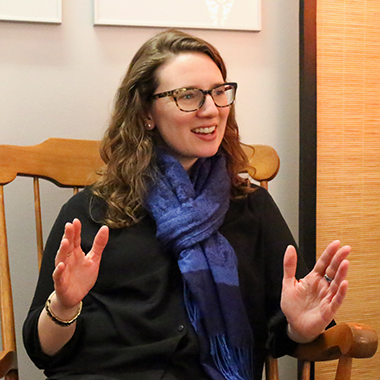As the 2024 year closes, something else more pressing to Lakeside students creeps upon us — the end of the semester. Whether it’s raising that A- just another 0.5% to make it an A, finishing up that one project you’ve been stressing about for the past month, or kissing up to your teachers just for a couple of good comments, ending the semester with a bang is at the top of most students’ bucket lists. But while our work is almost finished, for the backbones of Lakeside itself — the esteemed teachers — the work is just starting. Tatler interviewed teachers from across all departments to give you a sneak peek into a teacher’s life at the end of a grading period.
Which class do you teach, and how many students do you have?
Ms. Salah, English teacher: teaches 10th, 11th, and 12th grade, ~66 students
Profe Andrea, Spanish teacher: teaches 9th and 10th grade, ~58 students Mr. Milliano, Physics teacher: teaches 10th and 12th grade, ~69 students
Mr. Shiner, Math teacher: teaches all grades, ~57 students
Ms. Pace, History teacher: teaches all grades, ~50 students
Ms. Lutton, Human Development teacher: teaches 9th grade, ~22 students
What are some things you’re doing to prepare for comment-writing?

Ms. Salah: Contrary to popular belief, it’s hard for me to remember what every single kid does. For this reason, I don’t usually tend to write about behavioral things, but if I notice that a student is on the quieter side during our discussions, I’ll keep that in mind and try to get them to participate more in their comments. Another big one is I’ll notice if a student tends to rely a lot on technology. When it comes to academic work, I usually take snippets of comments I had already written for relevant assignments, and add that to their comments.
Profe Andrea: Any time there’s an assessment or quiz earlier in the quarter, if there are notable things to work on and improve, or if there are things kids are doing notably well, I’ll pull those out and write them down in a document. But more of what I’m trying to look for is behavior that leads to success and patterns that might be getting in the way of that success. So, in the classroom, sometimes I’m taking notes on a clipboard, and I’m often noticing when people are taking the initiative to do the hard thing — to stay in Spanish, to work with new material, to listen and respond really actively in small group conversations, and when there’s peer-to-peer teaching or encouragement happening. I’m also thinking of more general observations and habits around attention and engagement, and writing down the next thing — not everything — that I think the person could be working on.
Mr. Milliano: I’m going to focus my comments on the big Moon Project we’ve been doing in class. So, I will be recording thoughts tomorrow and Friday during presentations, and I will also be jotting down notes as I read the digital submissions of those projects. I have some initial ideas in my head around what I’ve observed as students have worked on these projects, but I don’t have them in writing this year.
Mr. Shiner: After a test, I can see what a student has done, what their thinking has been, and keep some notes for myself around that in a spreadsheet. I don’t usually keep notes around behavioral things because the experiences I have with students stick a little bit better in my head.
Ms. Pace: This is my sixth year at Lakeside, and it took me a little bit of time to figure out that it’s actually better to jot things down. For example, if I leave a class and a student has done something really exceptional, I go to my catalog of things and write some ideas down because I know that I’ll forget them later. But mostly, when it’s time to sit down and write the comments, I go back and look at all of the feedback I gave on other assignments, and I try to make sense of how the student is doing so I can see where the student is struggling and where the strength of the student is.
Ms. Lutton: It’s really hard to take notes and teach at the same time because active listening means really engaging in what the person is saying, and notetaking can sometimes distract me from what people are saying. However, during more student-driven big group discussions, I do try to make brief little notes on what students have shared so I can remember how they contributed to a conversation. More often, I’ve moved from what people have actually shared to more so what category it falls into — did someone ask a question, or did someone contribute something that moved the conversation forward in a new or unique way, or did someone build on the idea of somebody else? Another thing that I try to take notes on is the general way that people have shown up in class. Sometimes, that means if somebody who doesn’t participate very often does participate in class, I’ll make a note of that even though I don’t remember what they said. Or if somebody was a very active participant in class, I might make a note of that as well. On the flip side too, if somebody was disengaged in class, asleep, or took a long break from class, I’ll make a note of that too.
How long does it usually take you to write your comments?
Ms. Salah: It takes the entire weekend for me to do. Right after I get back from work, I go straight to writing comments. It usually takes me all Friday evening, all of Saturday, and sometimes I can finish mid-Sunday. I know it’s not healthy, and I’d definitely advise students not to do this, but before Lakeside tweaked the comments writing system, I’ve been up past 3:00 a.m. to finish them.
Profe Andrea: I’ve been experimenting with this: every time, I try something new. Originally, it would have taken me some after-school time during the week and a half before, and a lot of that last weekend. However, this year, I’ve already started to work on them before winter break, so my time is more spread out.

Mr. Milliano: Being new to Lakeside, I don’t have an efficient process yet; I’m still trying to navigate it and figure it out myself. I pretty much spent the whole Friday, Saturday, and Sunday of that weekend writing. What I mean when I say a “whole day” is I probably wrote for around six to eight hours for each of those three days.
Mr. Shiner: It really depends from year to year on how much work I’ve done before the weekend and also how structured my comment is. Some years, I will write each students’ comment individually and some years, I will put down parts of the comment piecemeal, so it’s hard to say how much time I spend per comment. But overall, I will say maybe two work days is the amount of time that it takes me to go from having a finished gradebook to having a full set of comments.
Ms. Pace: Long. We now have a comment-writing day, so we get three days for comments. My weekend is basically all comments plus that comment-writing day, and that is assuming I have all of my grading already done. So, if any project comes in right before the end of the semester or quarter, it’s having to grade those first before starting on comments. It takes me days of truly dedicated time to grade them.
Ms. Lutton: Comment-writing itself doesn’t take me a super long time; I think I have an advantage in English being my first language and being a pretty proficient writer. I usually aim to spend no more than fifteen minutes writing one student’s comment, but if I’m behind on grading, that five and a half hours of comment-writing is the least of my concerns.
What are your thoughts and feelings as you write comments?
Ms. Salah: When I’m burnt out from writing for so long, I get physically tired, my brain starts melting, and I can get into this “I want to get this over with” mindset. But at the same time, I feel bad because I want to make sure I give the student good feedback even though it’s a weekend and I’m looking outside my window, wishing I could be outside. Writing comments definitely takes away from time I could spend with my family and friends, or time I could spend separating my personal life from work life.
Profe Andrea: It feels like overwork during that time, and that’s why I’m trying to spread it out ahead of time. I know that as students, you guys often feel the stress of so many classes, so I’m asking myself questions like “where’s the opportunity to show you my perspective on what you’re doing well” and “what emerges in the pattern of your work beyond one assignment.”
Mr. Milliano: The same way that when you’re writing an essay or working on homework when it’s sunny outside, I’m like “ooh, I could go do that.” It’s definitely one of those things when I’m sitting at home, I notice this clutter and I think “I could clean this mess.” I think this happens for everyone — when I have this big daunting task, other tasks that are on my to-do list that make me feel more productive seem more attractive.
Mr. Shiner: I think I get stuck in my thinking in a way that if I write a bunch of comments one after another, they start to sound too much the same, and I start to think of the comments as opposed to the individual student. Pausing and taking breaks helps me reboot to get my brain resituated.

Ms. Pace: Whenever I write comments, I get to the point where I hate the sound of my own voice because I’m writing it, editing it, proofreading it, and eventually, I start becoming really self-critical but also truly not wanting to be in my own thoughts anymore. I start to burn out, which is why I try not to write too much in one day, and then everything I’ve written becomes a blur after a while.
Ms. Lutton: I try to tell myself to get a comment done in the next fifteen minutes, so I just concentrate in fifteen minute chunks. I’m a night person, so I usually write my comments after my kids have gone to bed, and there are also fewer distractions at night. There’s nothing else going on and the house is quiet. I would say the things I get distracted by are “ugh, I don’t want to do this, I want to do something else” or “I want to watch TV” or “I want to go to bed.”
What are your thoughts on Lakeside’s current grading system? Do you like it or dislike it? Why?
Ms. Salah: The system is okay, but students tend to focus too much on the letter grade and don’t take the comments into account. I think students should be graded on their ability to present, participate, and other important elements. Don’t get me wrong — writing is important — but there are other things that should also be factored into account.
Profe Andrea: I think it would be interesting to see what would happen if comments were done at a different time of year. What if comments went out between first quarter and second quarter — like trimesters? I think this would literally separate comments from grades, so your eyes don’t go straight to the grade on the top and then the “yeah, yeah, what did they say.” If there were just conversations with advisors around qualitative feedback, that would be interesting.
Mr. Milliano: I’m new to Lakeside, so I’m still trying to figure out how to make comments the most useful they can be. My feelings on them after writing them for the first quarter is that they are objectively a good and helpful thing, but I didn’t feel like my comments were helpful in proportion to how much time it took to write them. As I was writing them, I thought that I had given the feedback I’d wanted to in the moment already when it was more relevant, and comment-writing felt like it was more delayed feedback in time.
Mr. Shiner: It’s really hard to assign causality to comments and student growth. I think there are some things that happen after comments, for example, if I give many students recommendations to take advantage of test corrections, I will see an increase in students who do test corrections. But as for the step-by-step of student growth in a holistic sense in relation to the specifics of comments, there are a lot of pieces in between, and you get the individuality of each student as that process happens.
Ms. Pace: I do think comments can be useful, but I think that because comments get attached to grades, it feels like I’m justifying the grade I’ve given instead of how you can improve and grow. It also adds another layer of stress, and I think that defeats the purpose. I would much prefer comments to happen three times a year – almost like a trimester system. I understand that transcripts have to be updated and everything, but because we have these rolling gradebooks and students can see their grades, I feel like we should really zero down on these moments in time when feedback is removed from the grade itself.

Ms. Lutton: I think there are pros and cons to our current system. I don’t want to move to a system where we’re only giving a letter grade because there can be a lot behind a letter grade. So, I want that context associated with the letter grade. I know there are many teachers who would like to get rid of the letter grade because they think letter grades are the source of stress and competition amongst students, but I don’t believe that. I believe the roots of stress and competition amongst students has to do with something much bigger and deeper than grades — it has to do with the fact that we’re living in a time where there are a lot of people in the US who feel like there’s not enough to go around, whether that’s success, opportunity, or hope. As a result, letter grades are the thing that symbolize that to some extent, so a lot of people focus on that, but what we should be focusing on combating is all the stuff beneath that.
At the end of the day, teachers aren’t your “opps.” They’re people who seriously enjoy helping students grow and learn from mistakes, but at the same time, they understand your stress because they’re going through the same, tiring, gruesome work! As Ms. Pace says, “We’re just behind you in our sleep schedules being off. You’ll turn something in, and then, we’ll do all the work to grade it and make sure it’s back to you on time. So, we’re kind of going through the same cycles that you are throughout the quarter.” So, as you gear up for the final stretch of the semester, remember that the Lakeside community is in this together, and don’t be afraid to ask for help, support, and advice.



